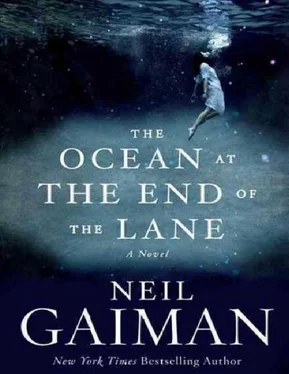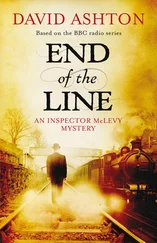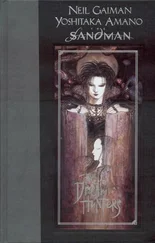She examined it, then licked her finger, touched it to the hole in my sole from which I had pulled the worm, two days before. There was a hissing noise, and the pain in my foot began to ease.
“En’t never seen one of these before,” said Ginnie Hempstock. “How did you get it?”
“There was a worm inside me,” I told her. “That was how it came with us from the place with the orangey sky. In my foot.” And then I looked at Lettie, who had crouched beside me and was now holding my hand, and I said, “I brought it back. It was my fault. I’m sorry.”
Old Mrs. Hempstock was the last to reach me. She leaned over, pulled the sole of my foot up and into the light. “Nasty,” she said. “And very clever. She left the hole inside you so she could use it again. She could have hidden inside you, if she needed to, used you as a door to go home. No wonder she wanted to keep you in the attic. So. Let’s strike while the iron’s hot, as the soldier said when he entered the laundry.” She prodded the hole in my foot with her finger. It still hurt, but the pain had faded, a little. Now it felt like a throbbing headache inside my foot.
Something fluttered in my chest, like a tiny moth, and then was still.
Old Mrs. Hempstock said, “Can you be brave?”
I did not know. I did not think so. It seemed to me that all I had done so far that night was to run from things. The old woman was holding the needle she had used to sew up my dressing gown, and she grasped it now, not as if she were going to sew anything with it, but as if she were planning to stab me.
I pulled my foot back. “What are you going to do?”
Lettie squeezed my hand. “She’s going to make the hole go away,” she said. “I’ll hold your hand. You don’t have to look, not if you don’t want to.”
“It will hurt,” I said.
“Stuff and nonsense,” said the old woman. She pulled my foot toward her, so the sole was facing her, and stabbed the needle down . . . not into my foot, I realized, but into the hole itself.
It did not hurt.
Then she twisted the needle and pulled it back toward her. I watched, amazed, as something that glistened—it seemed black, at first, then translucent, then reflective like mercury—was pulled out from the sole of my foot, on the end of the needle.
I could feel it leaving my leg—the sensation seemed to travel up all the way inside me, up my leg, through my groin and my stomach and into my chest. I felt it leave me with relief: the burning feeling abated, as did my terror.
My heart pounded strangely.
I watched Old Mrs. Hempstock reel the thing in, and I was still unable, somehow, to entirely make sense of what I was seeing. It was a hole with nothing around it, over two feet long, thinner than an earthworm, like the shed skin of a translucent snake.
And then she stopped reeling it in. “Doesn’t want to come out,” she said. “It’s holding on.”
There was a coldness in my heart, as if a chip of ice were lodged there. The old woman gave an expert flick of her wrist, and then the glistening thing was dangling from her needle (I found myself thinking now not of mercury, but of the silvery slime trails that snails leave in the garden), and it no longer went into my foot.
She let go of my sole and I pulled the foot back. The tiny round hole had vanished completely, as if it had never been there.
Old Mrs. Hempstock cackled with glee. “Thinks she’s so clever,” she said, “leaving her way home inside the boy. Is that clever? I don’t think that’s clever. I wouldn’t give tuppence for the lot of them.”
Ginnie Hempstock produced an empty jam jar, and the old woman put the bottom of the dangling thing into it, then raised the jar to hold it. At the end, she slipped the glistening invisible trail off the needle and put the lid on the jam jar with a decisive flick of her bony wrist.
“Ha!” she said. And again, “Ha!”
Lettie said, “Can I see it?” She took the jam jar, held it up to the light. Inside the jar the thing had begun lazily to uncurl. It seemed to be floating, as if the jar had been filled with water. It changed color as it caught the light in different ways, sometimes black, sometimes silver.
An experiment that I had found in a book of things boys could do, and which I had, of course, done: if you take an egg, and blacken it completely with soot from a candle flame, and then put it into a clear container filled with salt water, it will hang in the middle of the water, and it will seem to be silver: a peculiar, artificial silver, that is only a trick of the light. I thought of that egg, then.
Lettie seemed fascinated. “You’re right. She left her way home inside him No wonder she didn’t want him to leave.”
I said, “I’m sorry I let go of your hand, Lettie.”
“Oh, hush,” she said. “It’s always too late for sorries, but I appreciate the sentiment. And next time, you’ll keep hold of my hand no matter what she throws at us.”
I nodded. The ice chip in my heart seemed to warm then, and melt, and I began to feel whole and safe once more.
“So,” said Ginnie. “We’ve got her way home. And we’ve got the boy safe. That’s a good night’s work or I don’t know what is.”
“But she’s got the boy’s parents,” said Old Mrs. Hempstock. “And his sister. And we can’t just leave her running around. Remember what happened in Cromwell’s day? And before that? When Red Rufus was running around? Fleas attract varmints.” She said it as if it were a natural law.
“That can wait until the morrow,” said Ginnie. “Now, Lettie. Take the lad and find a room for him
to sleep in. He’s had a long day.”
The black kitten was curled up on the rocking chair beside the fireplace. “Can I bring the kitten with me?”
“If you don’t,” said Lettie, “she’ll just come and find you.”
Ginnie produced two candlesticks, the kind with big round handles, each one with a shapeless mound of white wax in it. She lit a wooden taper from the kitchen fire, then transferred the flame from the taper first to one candlewick and then to the other. She handed one candlestick to me, the other to Lettie.
“Don’t you have electricity?” I asked. There were electric lights in the kitchen, big old-fashioned bulbs hanging from the ceiling, their filaments glowing.
“Not in that part of the house,” said Lettie. “The kitchen’s new. Sort of. Put your hand in front of your candle as you walk, so it doesn’t blow out.”
She cupped her own hand around the flame as she said this, and I copied her, and I walked behind her. The black kitten followed us, out of the kitchen, through a wooden door painted white, down a step, and into the farmhouse.
It was dark, and our candles cast huge shadows, so it looked to me, as we walked, as if everything was moving, pushed and shaped by the shadows, the grandfather clock and the stuffed animals and birds (Were they stuffed? I wondered. Did that owl move, or was it just the flickering candle flame that made me think that it had turned its head as we passed?), the hall table, the chairs. All of them moved in the candlelight, and all of them stayed perfectly still. We went up a set of stairs, and then up some steps, and we passed an open window.
Moonlight spilled onto the stairs, brighter than our candle flames. I glanced up through the window and I saw the full moon. The cloudless sky was splashed with stars beyond all counting.
“That’s the moon,” I said.
“Gran likes it like that,” said Lettie Hempstock.
“But it was a crescent moon yesterday. And now it’s full. And it was raining. It is raining. But now it’s not.”
“Gran always likes the full moon to shine on this side of the house. She says it’s restful, and it reminds her of when she was a girl,” said Lettie. “And it means you don’t trip on the stairs.”
Читать дальше












